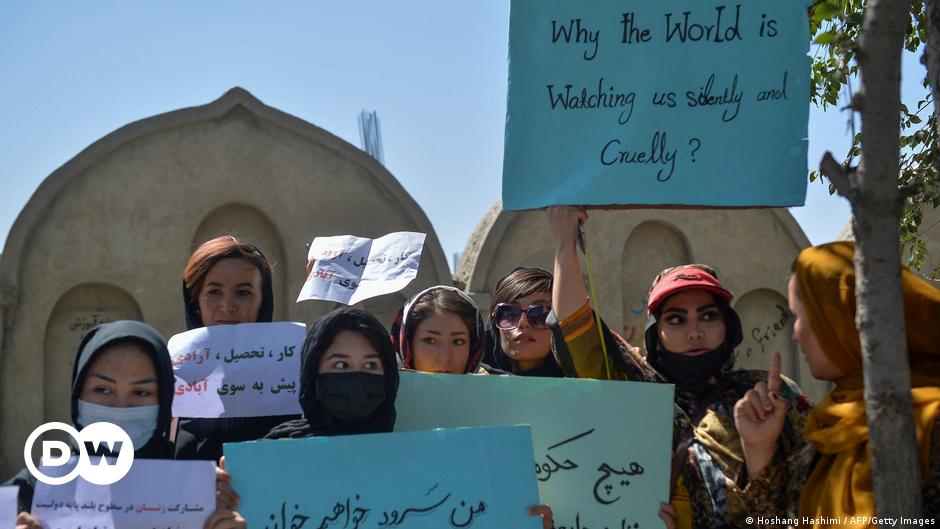
“For security reasons, demonstrations are banned in Afghanistan from now on,” reads the first official decree issued by the Afghan Interior Ministry under the Taliban regime.
The statement added that people must secure official permission before any protests, and security agencies must be informed of all details such as the kind of slogans that will be used during the demonstrations.
The ministry, which is now led by Sirajuddin Haqqani, who is wanted by the United States on terrorism charges, warned that protesters will face “severe legal consequences” in case of violations of the new rules.
The ban seems to be mainly targeted at female activists, who have been at the forefront of anti-Taliban protests since the Islamic fundamentalist group seized power in the country last month.
“We will continue to demonstrate for our rights, even without official permission,” Mahbobe Nasrin Dockt, a Kabul-based women’s rights activist told DW. “The Taliban-led Interior Ministry has not even started its work properly. Who should we seek permission from? It’s also obvious that they won’t give us permission once they know why we want to gather.”
Nasrin Dockt has been organizing demonstrations in the Afghan capital Kabul against the nation’s new rulers since early September. At a recent protest, she was arrested by the Taliban. “They entered my data into a system and warned me not to organize any more demonstrations. But I will not be intimidated. If we don’t fight, we’ve lost.”
Tough path ahead for Afghan women
Since the Taliban takeover, Afghan women have been afraid of reprisals and new restrictions of their rights by the Islamists. When the radical group was last in power, between 1996 and 2001, it banished women from education and public life.
Now, after seizing power again, the group pledged to respect progress made in women’s rights, but only according to their strict interpretation of Shariah or Islamic law.
The Islamists proceeded to immediately abolish the Ministry of Women’s Affairs, indicating a tough path ahead for women in the country.
The new government formed by the Taliban is all male, comprising mostly mullahs. Even in the Ministry of Education, female professionals are absent.
“The Taliban’s Higher Education Ministry consulted only male teachers and students on resuming the function of universities,” a lecturer who worked at a Kabul university during the last government told AFP news agency in late August. She said that showed “the systematic prevention of women’s participation in decision making” and “a gap between the Taliban’s commitments and actions.”
But women will be allowed to study at university, although there will be a ban on mixed classes, Abdul Baqi Haqqani, the Taliban’s acting higher education minister, said recently.
Taliban values ‘are not our values’
He announced that the Taliban would develop “a reasonable Islamic curriculum in accordance with Islamic, national, and historical values.” Women and girls have already been banned from playing sports.
In an interview with the Australian broadcaster SBS, the deputy head of the Taliban’s cultural commission, Ahmadullah Wasiq, said women’s sport was considered neither appropriate nor necessary.
“I don’t think women will be allowed to play cricket because it is not necessary that women play cricket,” Wasiq said. “In cricket, they might face a situation where their face and body will not be covered. Islam does not allow women to be seen like this.”
“Their values are not our values,” Basira Taheri from Herat city told DW. “The Taliban fighters have lived all their lives in some remote places, far away from civilization, and have only learned to fight. They can hardly read or write. Many of them have no idea of life in a city. Afghan society has changed over the past 20 years. We will not allow the Taliban to take away our rights,” she said.
In Herat, Taheri organizes demonstrations for women’s rights. At a recent protest, she was injured by Taliban fighters. She said she was lucky not to have been hit by a bullet. “It was a peaceful gathering. Several women made short speeches. Across from us, the Taliban were standing with weapons in their hands, watching us. Suddenly they started shooting, first in the air and then at us. I know that several women were seriously injured.”
International community support needed
Protests by and criticism from women’s rights activists appear to make the Taliban nervous. Journalists who report on women’s issues and demonstrations are being brutally beaten. Recently, two employees of the prominent newspaper Etilatrus were arrested by Taliban fighters and severely beaten.
“This is only a small part of what the Taliban did to journalists of the newspaper,” editor Saki Darjabai said.
One video shows a journalist unable to walk by himself, while another shows a journalist standing alone but barely able to speak.
“We need the support and solidarity of the international community,” says a women’s rights activist from Kabul, who asked not to be named.
She does not believe Afghan women can organize quickly and effectively against the Taliban. The shock of the Islamists’ takeover of Kabul still runs deep, she says, pointing out that the Taliban also cut off telephone and internet connections.
“The Taliban want global recognition. So, the international community must stand up for us and our rights. Under pressure from outside, they will give in,” the activist stressed.
This article was translated from German.








